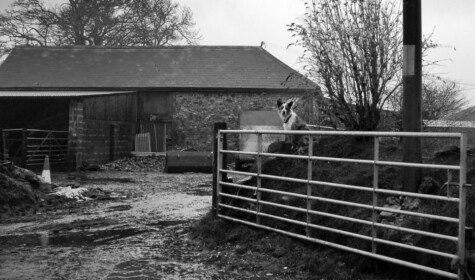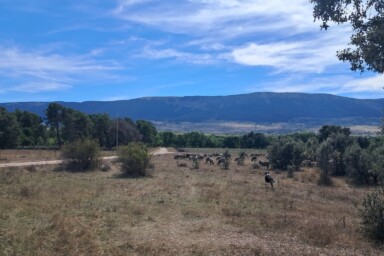As part of an ongoing series exploring the debate around what constitutes a healthy and sustainable diet in which we are featuring different, outside perspectives, Jessica Brown looks at the impact targeted vegan campaigns are having on individual livestock farmers.
“Lots of people have called me a murderer, rapist and kidnapper.” These aren’t the words of a convicted criminal, but of a Welsh dairy farmer describing the abuse she receives on social media.
Abi Reader, who farms just outside Cardiff, kept a close eye on social media throughout February for farmers receiving abuse during the first ever ‘Februdairy’, an online campaign set up by an ex-vegan animal scientist to promote dairy farming and production in response to January’s ‘Veganuary‘.
“People send horrible images of animal abuse that you can’t un-see,” she says. “They comment, if you put up a photo of a calf, to tell you you’ll be shooting it soon, and make assumptions that you keep calves in solitary confinement without food and water.”
And online abuse isn’t confined to social media. Dairy farmers across the UK recently expressed concerns for their privacy and safety after vegan activists uploaded an interactive map online showing their addresses and contact details. Some vegan activists also target farms and butchers through online petitions and bad reviews on Trip Advisor.
“Trip Advisor attacks have become very common because many businesses rely on the positive feedback people give on [the site],” says Tim Bonner, chief executive of the Countryside Alliance.
There are a number of factors contributing to the rise in veganism in recent years, including recent research claiming that plant-based diets contribute to improved health and help cut our carbon footprint.
But while the vast majority of people following a vegan diet are respectful of those who choose to include meat, dairy and other animal products in their diets, a few have made headlines in recent years for staging protests on farms and outside butchers and uploading video footage of their actions online.
Moorgate Farm in Potterspury, a mixed farm near Milton Keynes that specialises in free-range turkeys, has a long tradition of opening its doors to the public for two days every November, when customers can taste food before ordering it for Christmas, and see turkeys outside in the field. Last year, vegan activists turned up to both open days, carrying banners and shouting through loudspeakers.
“They’d obviously looked through my website, because they were criticising everything I was doing,” says Susan Gorst, who runs the farm. “One of things they mentioned was that I play music to my turkeys, which I mention on my website. They said that, because I was playing music to them from their arrival to when they are killed, that I was gaining their trust, creating a false sense of security, ready for killing – not because I was caring and understanding of their needs.
“They kept calling me a killer and asking how we kill the animals. We tried to talk to them, but they didn’t want to hear the other side of the story,” she says. After failed attempts to get them to leave, she called the police, who removed the activists from her farm.
Farmers are unsure of how to react to this activism, whether it’s online or on their farms. Reader says she sometimes feels the need to reply to misinformed comments online, just so she can put the facts right for others who might see them, but she feels she shouldn’t have to do this.
The attacks – as well as the constant threat of attacks – are having lasting effects on farmers’ mental wellbeing. Time to Change Wales points out that farmers, are already at significant risk of depression and suicide – at least one farmer commits suicide every week in the UK – and stress is a significant contributing factor, along with isolation and financial pressures. Animal farmers are among the most at risk.
“The last 24 months have been disgraceful,” says Reader. “One of my staff had a death threat and we had to introduce an activist policy on the farm, so they know what to do when [attacks] happen.
“I feel for the safety of my staff, and my mother, who’s in her 70s and works on the farm,” she says.
Reader says she’s also concerned about the safety of the animals, especially after seeing videos online where activists have let cows out of their enclosures.
Gorst took the attack personally – especially when she found out the protesters were all local residents.
“I felt really hurt – I couldn’t work out why they’d attack me when I’m a great believer in doing what is best for the animals.
“When things like this happen, you have to look at people differently. It affects you as a person, when you open your farm up you become vulnerable, and there are people out there taking advantage of that vulnerability, who don’t realise you really have to care about animals to be a farmer.”
This abuse can be particularly psychologically impactful for those who aren’t used to it. Tim Bonner comments, “Many farmers live in isolated communities, and the threat is a real shock to them. They tend to rely on traditional networks, they’re not always outward-facing communities that can bring large numbers of people together. And these threats are external, so people become more introspective and less welcoming. There’s an inequality of arms, especially with the use of technology,”
This technology separates recent vegan activism from the decades of animal rights campaigns by allowing it to be more effective and have greater reach. There’s a responsibility on social media companies to take more seriously the threats aimed at farmers and related businesses, and act as quickly as possible when there’s a targeted attack on a business, on sites such as Trip Advisor. More widely, there have been persistent calls for social media giants, including Facebook, Twitter and Instagram, to improve their anti-cyber bullying and harassment measures.
Aside from the policies individual farms can devise in the event of a protest, it seems there’s a lack of a grand plan to help tackle the abuse aimed at farmers from the rise of the vegan movement.
Gorst is worried about history repeating itself, especially after hearing rumours that the protests are going to be worse this November and December, when the farm opens again for visitors. She’s considering how she can better protect her staff and animals and detect potential threats on the open days.
Reader tries to engage with the public as much as possible in the hope it will help to prevent similar incidents happening again, but she says it’s never enough.
“It’s hard to get to the people sending out loads of negative messages from behind their keyboards to come and see for themselves that farming isn’t what they think it is”.
But whatever happens this year, Gorst is adamant that she will not stop opening her farm up to the public, the vast majority of whom understand and appreciate Gorst’s farm and the work she does to ensure her animals and customers are happy.
“People don’t understand that, to do this job, you need to really love animals,” she says.
We publish a range of articles from different contributors outside of the Sustainable Food Trust; they do not necessarily reflect official SFT position or viewpoints.







